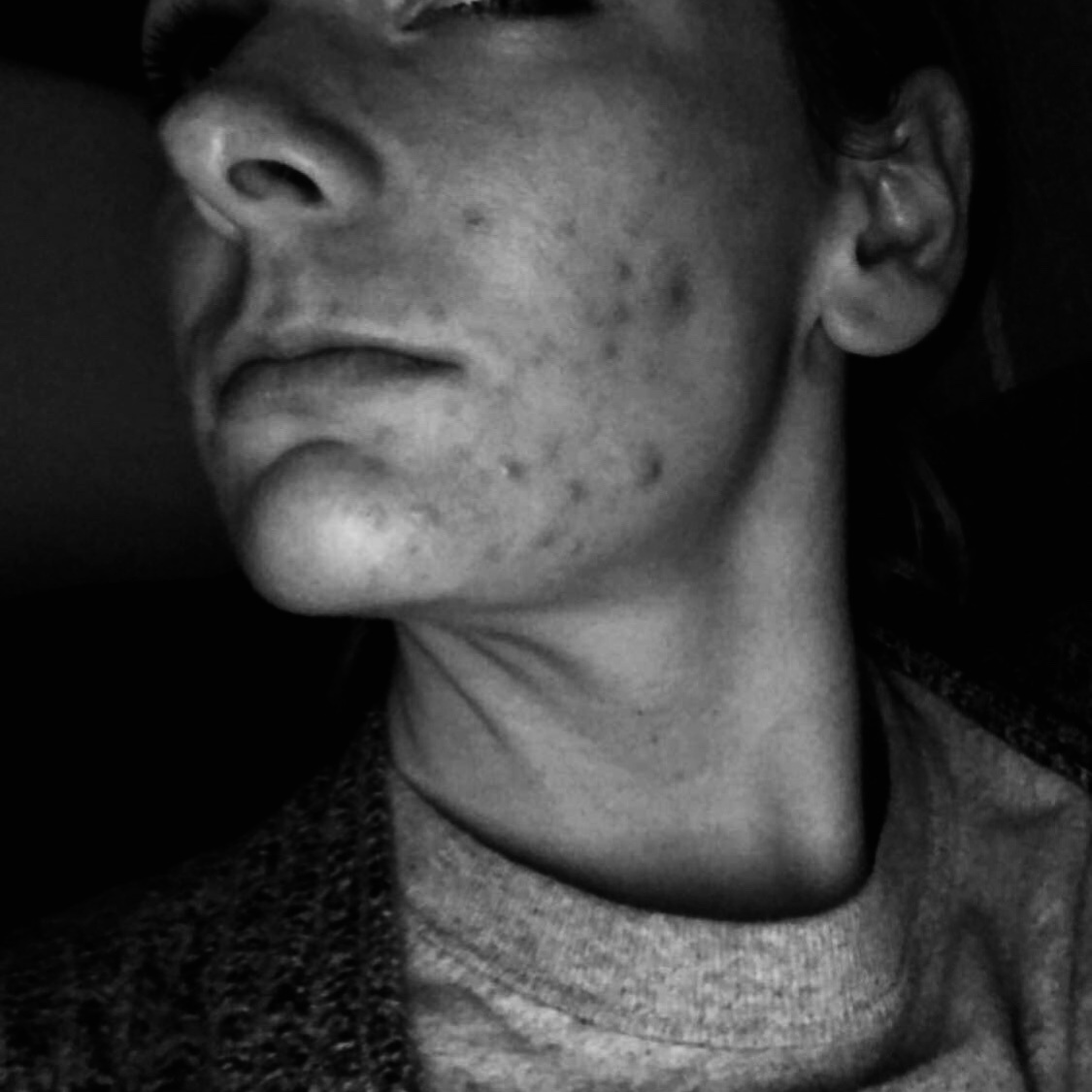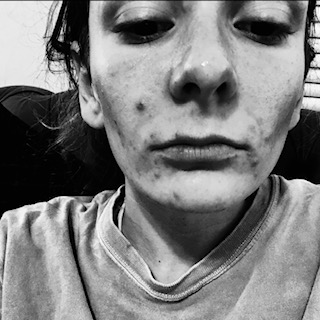HOW SPIRONOLACTONE CURED MY HORMONAL ADULT ACNE
Note: This post contains affiliate links and I may earn a small commission if you choose to shop through my links.
Please keep in mind that the price + availability of items featured within the post may change after publish date.
ACNE IS HELL.
I’ll never forget the way my adult acne made me feel.
I'll never be able to shake myself of the weighty defeat and devastation that overcame me each morning when I woke up to a new, throbbing cyst festering just above my lip, on my cheek or along my jawline. Or, on really special days, all three.
Acne brought about the kind of pain that made the physical act of smiling, laughing or even eating almost unbearable. It stripped me of my confidence and sent me spiraling into state of obsession, reclusion and depression.
Guys, I tried everything.
I cut out dairy, I took antibiotics, I stopped wearing makeup, I changed my pillowcases every day, I cleansed and moisturized and used a topical retinol like my life depended on it but, alas - nothing changed. Nothing made a lasting impact and I continued to wake up with the all-too-familiar throbbing above my lip, on my cheek or along my jaw.
Not only was my physical appearance impacted by my battle with acne but after a year and a half of waking up without results, my but my mental and emotional health was deteriorating as well.
Oh, and did I mention that my acne was progressively worsening each week while I was smack-dab in the middle of planning my wedding? Because 17+ active pimples at a time are just what every bride wants while tackling seating charts, preparing for once-in-lifetime photos and battling impossible family egos, right?
After 1.5 years of trying all the things, I finally sought out a new primary care doctor in October 2017. I proceeded to unload alllll my skin struggles and a myriad Web MD-infuced fears on my kind, new doctor during our first appointment.
She looked into my file and saw that I was currently using Nexplanon, the arm implant birth control that prevents pregnancy for three years. My doctor informed me that it may be a large contributing factor to my adult onset acne.
Now, at this point you may be thinking, "Oh, problem solved. She figured it out. Just remove that pesky-little implant, start a new birth control and you're good to go."
But if you’ve ever been on the pill or any other kind of hormonal contraceptive, you know that birth control is not a one-size fits all type of situation and while removing the implant may have helped my skin, introducing a new birth control could impact me just as negatively in others areas of my body. Adjusting to new hormones can be a fast track to some serious, sometimes unpredictable side effects like next-level mood swings, difficult-to-lose weight gain, debilitating migraines and more.
And what if the Nexplanon wasn’t the culprit at all? What if I started a new medication and continued to have these life-sucking breakouts while also taking on other gnarly side effects?
My doctor understood my concerns and she suggested that I stick with the Nexplanon for birth control, but add a new, surprising medication to my routine to combat my acne: Spironolactone.
Spironolactone (also called Spiro) isn’t technically an acne medication at all. It’s a diuretic that’s prescribed to treat high blood pressure and water retention, but it also has a really amazing side effect of reducing oil production in the skin by blocking androgen receptors. Because of this, doctors often prescribe spironolactone to women suffering from adult onset, hormonal acne or female pattern hair loss.
Thicker hair and clearer skin? Yeah, if spironolactone sounds like a miracle pill, that’s because it is.
I began my spironolactone journey in December 2017 at 100 mg per day. I went through a purging period where my skin broke out like crazy for around a week but after that, my skin transformed before my eyes. My breakouts were smaller and the pimples I did have pop up healed faster than ever before. It was incredible.
After three months on spironolactone, my doctor upped my prescription to 150 mg per day. My skin continued to steadily improve and I saw less cystic spots and improved texture so after another few months, we decided to up my prescription again to 200 mg each day. About a month after our wedding in June 2018, I had my Nexplanon implant removed and started taking Beyaz birth control every day.
Fast forward to Fall 2019 and I can honestly say that the results from spironolactone and Beyaz are nothing short of remarkable.
My once, notoriously oily complexion is now considered normal and remains shine-free most days. The cavernous pores that embellished my T-zone are nearly invisible and the congested, surface-level pimples and black heads that gave my skin a rough texture are totally non-existent. And those deep-rooted, throbbing cysts that used to greet me every morning? I may have one (not FIVE) may pop up every few months, usually around the third week of my menstrual cycle. Sometimes one makes a surprise appearance after I (over) indulge in dairy or carbs but that’s to be expected and the spots are never anything that a little dab of Shape Tape can’t handle.
IS SPIRO RIGHT FOR YOU?
Maybe (I really, really hope so!) but also, maybe not. The efficacy of spironolactone depends on the type of acne you’re battling.
SPIRO IS NOT FOR YOU…
If you’re battling BACTERIAL ACNE. Bacterial acne affects the surface of the skin with a mix of blackheads, whiteheads, pimples and pustules. The location of bacterial breakouts varies and can affect the entirety of the face including (but not limited to): the hairline, forehead, cheeks and temples.
Treatment for bacterial acne ranges greatly and depends on both the severity of your condition and the specific type(s) of bacterial blemishes you are battling. Doctors may prescribe a course of acne-fighting, antibiotic medications such as tetracycline, minocycline or doxycycline. In addition to antibiotics, your doctor may also recommend topical treatments because bacterial blemishes are on the surface of the skin and as such, are more receptive to external therapies. Common topical treatments prescribed to battle bacterial acne include: benzoyl peroxide, salicylic acid and tretinoin.
SPIRO MAY WORK FOR YOU…
If you are a WOMAN suffering from CYCLICAL, HORMONAL ACNE. This type of acne is frequently associated with (but not limited to) painful, cystic outbreaks under the skin, along the lower half of the face and jawline.
While hormonal acne breakouts may respond to topical treatments like salicylic acid once surfaced, the deep-rooted cystic spots will never be eradicated from topical treatments alone. It’s important to understand that hormonal acne is an internal problem that requires internal treatments. It will not go away with a diligent skincare routine of mud masks, moisturizers and drying creams. You may find relief from your favorite spot treatments but with hormonal acne, that relief will be short-lived because a new blemish (or 3) will pop-up to replace healed spots like clockwork.
I know this is a hard pill to swallow, I know. The good news, though? The sooner you accept that your hormonal acne won’t away with any combination of any of the several, overpriced and/or over-hyped skincare products your blemish-free bestie swears by, the closer you will be to finding a treatment plan that actually works. The best — nay, the only — way to manage your unmanageable hormonal acne is to sit down with a trusted doctor and talk through allll your symptoms, discuss allll your concerns and be open to different therapies.
HOW TO PREP FOR YOUR ACNE APPT
DOCUMENT YOUR SKIN
Take photos of your skin each day to give your doctor a visual of the progression of your condition. My doctor was unconvinced at my first appointment because my makeup disguised my active spots and she was appreciative when I gave her more visuals representations of my condition.PROVIDE A PRODUCT LIST
Bring a list of all the products you’ve tried and fill them in on which of them (if any) sort of worked and which of them made things worse. And think beyond skincare, friends. Be sure to include all the makeup, hair, body and laundry products you come in contact with on a regular basis.BE HONEST ABOUT YOUR MENTAL HEALTH
Be open about the physical impact your acne is having on you, but also be transparent about the emotional and mental impact it may have on you, too. Acne led me into a dark place of obsessive behaviors, avoidant social anxiety and depression. My doctor suggested an anti-anxiety medication to cope with these symptoms and while I turned the medication down at the time, I look back on that period of my life and wish I had taken her up on that offer. Acne may not affect you this way but if it does, I urge you to explore those symptoms with your doctor and find relief for every aspect of this condition.ADVOCATE FOR YOURSELF
YOU. ARE. YOUR. BEST. ADVOCATE. Read that, receive that, understand that. No matter how well-meaning your doctor may be, they are not you and they do not know when/if something feels off with your treatment plan. Be prepared to tell your physician what you need, what you want and what’s not working for you. If you’ve been on a treatment plan for a few months and aren’t seeing results, tell your doctor you want to explore other options. If you think you would benefit from a topical cream, ask them for it. If you think your “bacterial acne” may actually be a hormonal imbalance, tell them that. Don’t be shy and don’t be scared to ask them to take different approach to your treatment plan.



